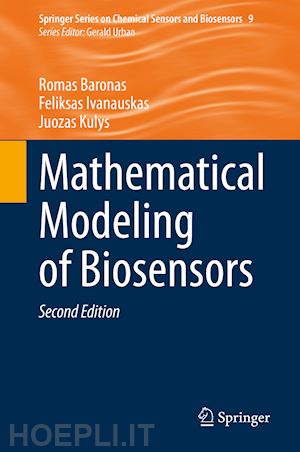
Questo prodotto usufruisce delle SPEDIZIONI GRATIS
selezionando l'opzione Corriere Veloce in fase di ordine.
Pagabile anche con Carta della cultura giovani e del merito, 18App Bonus Cultura e Carta del Docente
This newly designed and enlarged edition offers an up-to-date presentation of biosensor development and modeling from both a chemical and a mathematical point of view. An entire new chapter in particular is dedicated to optimal design of biosensors. Two more new chapters discuss biosensors which utilize microbial cells and are based on carbon nanotubes respectively. All the other chapters have been revised and updated.
The book contains unique modeling methods for amperometric, potentiometric and optical biosensors based mainly on biocatalysts . It examines processes that occur in the sensors' layers and at their interface, and it provides analytical and numerical methods to solve equations of conjugated enzymatic (chemical) and diffusion processes. The action of single enzyme as well as polyenzyme biosensors and biosensors based on chemically modified electrodes is studied. The modeling of biosensors that contain perforated membranes and multipart mass transport profiles is critically investigated. Furthermore, it is fully described how signals can be biochemically amplified, how cascades of enzymatic substrate conversion are triggered, and how signals are processed via a chemometric approach and artificial neuronal networks. The results of digital modeling are compared with both proximal analytical solutions and experimental data.
Introduction to Modeling of Biosensors.- Effects of Diffusion Limitations on the Response and Sensitivity of Biosensors.- Biosensors Utilizing Consecutive and Parallel Substrates Conversion.- Biosensors Response Amplification with Cyclic Substrates Conversion.- Biosensors Utilizing Synergistic Substrates Conversion.- Biosensors Acting in Injection Mode.- Chemically Modified Enzyme and Biomimetic Catalysts Electrodes.- Biosensors with Porous and Perforated Membranes.- Biosensors Utilizing Non Michaelis-Menten Kinetics.- Biosensors Based on Microreactors.- Modeling Carbon Nanotube Based Biosensors.- Modeling Biosensors Utilizing Microbial Cells.- Application of Mathematical Modeling to Optimal Design of Biosensors.
Feliksas Ivanauskas is a Professor Emeritus of the Vilnius University (Lithuania). He joint this university in 1972 as Senior Lecturer, and later on, as Associate Professor, Professor, Head of the Department of Mathematical Software, Head of the Department of Differential Equations and Numerical Mathematics, Head of the Department of Computer Science II, and Dean ofFaculty of Mathematics and Informatics.
He received his Ph.D. in Mathematics from the Moscow State University and the second degree (Habilitation Doctor) in Mathematics from the Institute of Mathematical Modeling, Russia AS (Moscow), in 1974 and 1992, respectively. He has published 250+ scientific articles and holds two patents on solid-state sources of light. Prof. Ivanauskas received the Lithuanian National Prizes in Science 1995 and 2010. He was Chair of the Division of Mathematical, Physical and Chemical Sciences of Lithuanian Academy of Science from 2009 until 2017.
Juozas Kulys is a Professor Emeritus of the Life Sciences Center of Vilnius University (Lithuania), and his main scientific interests focus on chemical problems of biocatalysis, biosensors development and modeling. He received his Ph.D. from the M. V. Lomonosov Moscow State University (Russia) in 1970, and the second degree (Habilitation Doctor) at the N. N. Semenov Chemical Physics Institute in1982. In 1984 he was assessed as Professor of Physical Chemistry, and worked as Senior Research Associate, Head of the Department of Enzyme Chemistry (1974-2016) and as a Director (1986-1992) of the Institute of Biochemistry of Vilnius University (Lithuania). From 2001 until 2018 he was also the Head of the Department and professor of Chemistry and Bioengineering of Vilnius Gediminas Technical University (Lithuania). He was awarded the State Science Prize (1987), the Baltic Assembly Premium of Science (1995), National Science Premium (2002), and he was elected as a member of the Lithuania Academy of Sciences (1990).











Il sito utilizza cookie ed altri strumenti di tracciamento che raccolgono informazioni dal dispositivo dell’utente. Oltre ai cookie tecnici ed analitici aggregati, strettamente necessari per il funzionamento di questo sito web, previo consenso dell’utente possono essere installati cookie di profilazione e marketing e cookie dei social media. Cliccando su “Accetto tutti i cookie” saranno attivate tutte le categorie di cookie. Per accettare solo deterninate categorie di cookie, cliccare invece su “Impostazioni cookie”. Chiudendo il banner o continuando a navigare saranno installati solo cookie tecnici. Per maggiori dettagli, consultare la Cookie Policy.